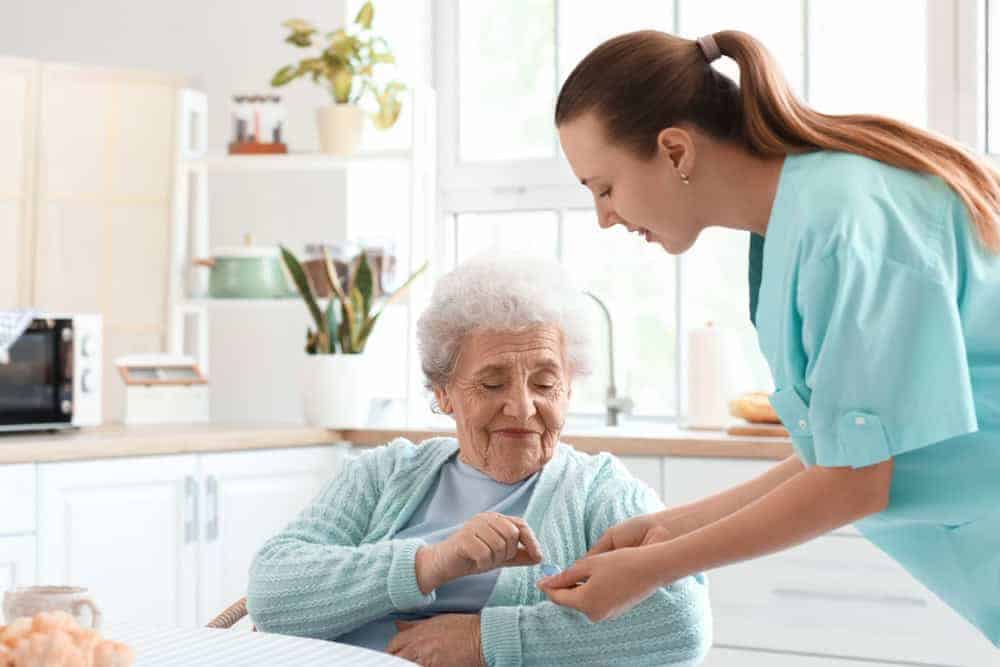
Caring for an elderly loved one can be a challenging task, especially when their needs become more complex with age. Many families struggle with knowing when it’s time to seek professional help. One option to consider is hiring a home health aide.
But how do you know if it’s the right time to bring in a professional and if it’s the right choice?
In this article, we’ll cover everything you need to know about home health aides, including what they do, how to recognize when your elderly loved one needs assistance, and how to choose the right aide for your family’s unique situation.
What Is a Home Health Aide (HHA)?
A home health aide (also called a home care aide or home help aide) is a trained professional who assists elderly individuals, people with disabilities, or those recovering from illness or surgery with their daily living activities.
HHAs, sometimes abbreviated, help bridge the gap between living independently and receiving full-time nursing care, allowing people to remain in their homes while getting the help they need.
Duties and Responsibilities of a Home Health Aide
The services provided by home health aides can vary depending on the needs of the individual. However, the most common duties include:
- Personal Care: Helping seniors with activities such as bathing, dressing, grooming, and using the restroom. This ensures your elderly loved one stays clean, comfortable, and dignified.
- Mobility Support: Assisting with walking, using mobility aids, or repositioning in bed. For elderly individuals or people with disabilities, moving around safely is critical to avoid falls and injuries.
- Medication Management: Home health aides help remind older adults to take medications on time and may assist with simple tasks like organizing pills into a daily pillbox. For older adults taking multiple medications, this can be essential to staying healthy.
- Light Housekeeping: Home health aides often assist with basic household tasks, from cleaning to doing laundry and preparing meals. This helps your loved one maintain a clean, safe, and comfortable living environment.
- Companionship and Emotional Support: In addition to providing physical help, home health aides often serve as companions, offering emotional support and reducing feelings of loneliness or isolation.

The Difference Between a Home Health Aide and Other Caregivers
A home health aide is different from a personal care aide (caregiver), or a nurse.
Personal care aides assist with daily activities but may not have the same training as home health care aides. Nurses, on the other hand, provide skilled medical care, such as wound care or injections.
HHAs can often fill the gap between these two roles, offering both personal and basic health care.
Home health aid falls under the general home health care services. Sometimes, we see these terms get mixed up. Let’s explore other different types of home health care services.
Types of Home Health Care Services
In addition to the invaluable support provided by a home health aide, elderly seniors can receive a wide range of health care services in the comfort of their own homes.
The types of care available are often tailored to the individual’s specific needs, ensuring that medical and non-medical support is delivered seamlessly. The home care options for seniors are virtually limitless, allowing them to remain in a familiar environment while receiving top-quality care.
Doctor Care
A doctor may visit the home for seniors with complex medical needs to diagnose and treat illnesses. This can include managing chronic conditions, conducting physical exams, adjusting medications, or providing follow-up care after hospitalization.
Doctor care at home is especially beneficial for those who are bedridden or have mobility challenges, ensuring they receive proper medical attention without having to travel to a clinic.
Nursing Care
Nursing care is one of the most vital components of home health services. A registered nurse (RN) or licensed practical nurse (LPN) provides medical care such as wound care, intravenous therapy, pain management, and monitoring of vital signs.
They can also help with managing chronic conditions like diabetes, heart disease, or respiratory disorders. Nurses in home health care often serve as a bridge between the patient and their doctor, ensuring continuity of care and monitoring any changes in health.
Physical, Occupational, and Speech Therapy
Therapy services are a key part of rehabilitation for seniors recovering from illness, injury, or surgery.
Physical therapy helps patients regain strength, balance, and mobility, which is critical for preventing falls and maintaining independence.

Occupational therapy focuses on helping individuals perform daily activities like dressing, eating, and bathing more effectively and safely.
Speech therapy assists those who may have speech or swallowing difficulties due to stroke or other medical conditions. Therapists work on communication skills and swallowing techniques to improve quality of life.
Medical Social Services
A medical social worker provides support for patients and families dealing with emotional, financial, or social challenges related to illness or aging. Social workers can help arrange resources, offer counseling, and assist with long-term planning, such as finding additional support or housing. They also help patients navigate the healthcare system and advocate for their rights and needs.
Nutritional Support
A dietitian or nutritionist can visit the home to create personalized meal plans based on the senior’s health needs, dietary restrictions, or chronic conditions. Proper nutrition is crucial for managing conditions like diabetes, heart disease, and kidney disease, and nutritional support helps ensure seniors are getting the right nutrients to maintain their health and strength.
Pharmaceutical Services
Pharmaceutical services ensure that seniors receive proper medication management at home. A pharmacist may be involved in preparing and delivering medications, setting up pill dispensers, and educating patients or caregivers about how to properly administer medications.
This service is essential for those on multiple medications or with complex medical needs that require frequent medication adjustments.
Additional Home Health Care Services
Other home health care services that may be provided include:
- Home health equipment and supplies: Delivering and setting up medical equipment like oxygen machines, wheelchairs, or hospital beds.
- Laboratory services: Collecting blood or other samples for diagnostic tests without the need to visit a lab.
- Respiratory therapy: For individuals with chronic respiratory issues, therapists can help manage oxygen therapy or provide treatments for lung conditions.
Home health aide as part of home health care focuses on the non-medical/basic health care needs of your elderly loved one.
Signs Your Elderly Loved One May Need a Home Health Aide
Determining when it’s time to hire a home health aide can be a challenging decision. You might notice gradual changes in your loved one’s behavior, physical abilities, or mental state.
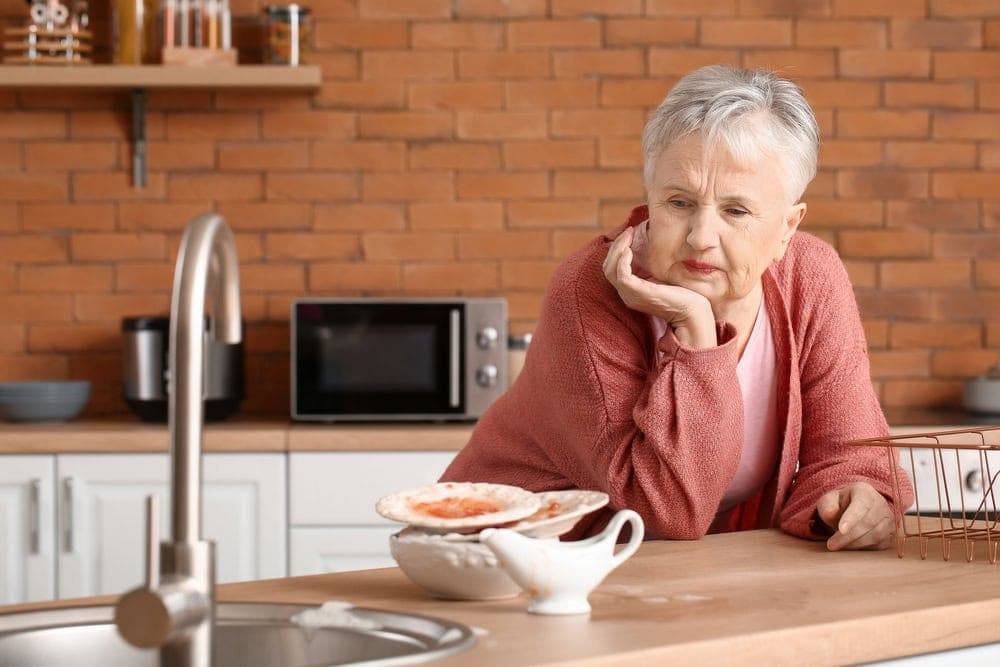
Here are some clear signs that indicate your elderly loved one may need professional assistance at home:
1. Difficulty with Personal Care and Hygiene
If your loved one is having trouble maintaining their personal care routine—whether it’s bathing, brushing teeth, or dressing—they might benefit from the help of a home health aide. Noticing body odor, unkempt hair, or soiled clothing are common indicators that they are struggling.
2. Frequent Falls or Difficulty Moving Around
Mobility challenges can lead to dangerous falls. Elderly individuals who experience difficulty walking, getting in and out of bed, or standing for long periods may benefit from having a home health aide who can assist with transferring and mobility support. A fall can be life-threatening for seniors, and a home health aide can reduce that risk.
3. Forgetting Medication or Missing Medical Appointments
Failing to take medication as prescribed or missing medical appointments can be a sign that your loved one is having trouble keeping track of their health needs. A home health aide can help manage medication by providing reminders and organizing medications, ensuring your loved one stays on top of their health routine.
4. Increased Forgetfulness or Cognitive Decline
Memory issues are common as people age, but if your loved one’s forgetfulness is starting to interfere with their daily life—such as leaving the stove on, forgetting to eat, or wandering off—they may need the extra care and supervision that a home health aide provides. HHAs trained in dementia care can also assist those with Alzheimer’s or other forms of dementia.
5. Difficulty Managing Household Tasks
If simple household chores like cooking, cleaning, or grocery shopping are becoming too difficult for your loved one to manage, they could benefit from the assistance of a home aide. A home health aide can help with these tasks, allowing your loved one to continue living comfortably at home without the stress of managing their household alone.

6. Social Isolation and Loneliness
Older adults who live alone can often feel socially isolated, which can contribute to depression or anxiety. A home health aide provides companionship, helping to prevent feelings of loneliness and offering meaningful social interaction.
The Benefits of Hiring a Home Health Aide
Hiring a home health aide offers numerous benefits for both elderly individuals and their families. Here are some of the top advantages of bringing in a home aide:
Personalized Care Tailored to Your Loved One’s Needs
A home health aide will work with your loved one to develop a personalized care plan that addresses their specific needs. Whether your loved one needs assistance with bathing, eating, or taking medications, the aide will ensure that all care is tailored to suit their daily routine and preferences.
Enhanced Safety and Fall Prevention
The physical assistance a home health aide provides helps prevent accidents, particularly falls, which are a common risk for the elderly. A home health aide can assist with mobility, making sure your loved one moves safely around the house, and reducing the risk of injury.
Companionship and Emotional Support
Beyond physical assistance, home health aides often form meaningful relationships with the elderly, offering companionship that can help reduce loneliness. Emotional support is just as important as physical care, and many older adults appreciate having someone they can talk to and share their day with.
Respite for Family Caregivers
Caring for an elderly loved one can be exhausting, both physically and emotionally. Hiring a home health aide gives family caregivers some relief. It allows them to focus on their relationship with their loved one rather than being solely responsible for care. This can prevent burnout and ensure that your family member gets the best possible support.
Maintaining Independence and Quality of Life
A key advantage of hiring a home health aide is that it allows elderly individuals to maintain their independence. With support for daily activities, they can continue living in their own homes, preserving their dignity and quality of life without the need to move into a nursing home or assisted living facility.
Educational Requirements For Home Health Aides
Wondering if home health aides (HHAs) need training or certification before they can start providing care?
While the role may seem straightforward, home health aides must meet specific educational and training requirements to ensure they can deliver safe and effective care.
Whether they are assisting with personal hygiene, providing basic health monitoring, or administering medications, HHAs need the right foundation to handle the diverse needs of elderly citizens. In most cases, this includes formal education, certification, and on-the-job training.
Basic Educational Requirements
The minimum educational requirement for a home health aide is typically a high school diploma or equivalent. While not all positions demand this, many employers, especially agencies, prefer candidates who have completed high school education as it demonstrates foundational knowledge, literacy, and problem-solving skills.
In cases where a diploma isn’t required, home health aides must still possess basic competencies, such as understanding written instructions, communicating clearly with clients, and performing basic health-related tasks under supervision. This ensures they are well-prepared to help your elderly loved one, or individuals with disabilities or chronic illnesses in various aspects of daily living.
Formal Training Programs
Many home health aides must complete formal training programs, especially if they work for agencies that receive federal funding, such as Medicare or Medicaid. Federal regulations require a minimum of 75 hours of training, including 16 hours of supervised practical work. Although some states require up to 120 hours. This is often mandated for HHAs who work in long-term care settings or provide more complex medical assistance.

Vocational schools, community colleges, and even some private care agencies offer training programs for home health aides. These programs typically cover a range of topics, including:
- Basic healthcare practices
- Personal care assistance (bathing, grooming, feeding)
- Infection control
- Safe patient transfers and mobility assistance
- Basic nutrition and cooking for clients
- Communication skills
- Reporting and documentation of patient progress or concerns
- Basic first aid and CPR
Some programs also provide specialized training for working with individuals who have specific medical conditions, such as dementia or mobility impairments.
Certification Requirements
In many states, home health aides are required to obtain certification after completing their training. Certification is often granted through passing a state exam or a program approved by the Department of Health and Human Services.
- Certified Home Health Aides (CHHA): This designation indicates that the aide has met state requirements for both training and competency. In states where certification is mandatory, it ensures that aides can competently handle the tasks required for home health care.
- State-to-state variations: It’s important to note that the certification requirements for home health aides can vary depending on the state. Some states have additional training requirements, while others may allow aides to work without certification for certain types of non-medical care roles.
Specialized Training for Complex Care
Home health aides who work with individuals with chronic illnesses, or disabilities, or require long-term care often undergo specialized training. This could involve learning how to:
- Care for patients with Alzheimer’s or dementia
- Monitor vital signs and report changes to healthcare professionals
- Administer medications and treatments under the supervision of a nurse or doctor
- Use specialized equipment such as feeding tubes or ventilators
- Assist with physical therapy exercises
Specialized training ensures that aides can meet the complex medical needs of these individuals, providing effective care while reducing the risk of harm.
Why Training is Crucial for Home Health Aides
A well-trained home health aide can make a significant difference in the quality of life for your beloved senior. The training and education they receive help them:
- Ensure safety: Proper training ensures that aides know how to prevent falls, infections, and other health risks that can occur in a home setting.
- Provide personalized care: Certified and trained HHAs are better equipped to understand the unique needs of your loved one, ensuring they provide individualized care tailored to specific medical conditions.
- Support family members: Families can feel confident knowing that their loved one is being cared for by a professional who understands their needs and how to handle medical emergencies or daily care challenges.
What Skills Are Required For Home Health Aides?

Home health aides must possess a range of essential skills to provide quality care to seniors. Below are seven critical skills every HHA should have:
1. Compassion and Empathy
Compassion helps HHAs connect with patients emotionally, making them feel comfortable and cared for. Empathy allows aides to understand your loved one’s emotional and physical challenges, helping them provide support tailored to their unique needs.
2. Communication Skills
HHAs need to communicate clearly with both individuals and their families. Good communication helps in giving instructions, updating healthcare professionals, and addressing any concerns your loved one may have.
3. Attention to Detail
Monitoring vital signs, following care plans, and noting any changes in seniors’ health require a keen eye for detail. This skill is essential to prevent complications and ensure your loved one receives proper treatment.
4. Physical Stamina
The job often involves lifting seniors, assisting with mobility, and performing physically demanding tasks like bathing and dressing. Aides must have the stamina to manage these tasks while keeping seniors safe and comfortable.
5. Problem-Solving Skills
HHAs frequently encounter unexpected situations, such as medical emergencies or behavioral changes. Quick thinking and problem-solving skills are necessary to handle these challenges effectively and ensure patient safety.
6. Time Management
Managing multiple tasks—such as administering medications, assisting with meals, and housekeeping—requires excellent time management. Staying organized ensures that all aspects of your loved one’s care are handled efficiently throughout the day.
7. Basic Medical Knowledge
While HHAs are not licensed nurses, understanding basic medical concepts like administering medications, recognizing symptoms of illness, and taking vital signs is essential. This knowledge helps aides provide safe and effective care under the supervision of healthcare professionals.
How to Determine the Right Time to Hire a Home Health Aide
Deciding when to bring in a home health aide can be a difficult decision for families. Here are some steps that can help guide your decision:
1. Conduct an Honest Assessment of Your Loved One’s Needs
Start by assessing your loved one’s physical and emotional needs.
- Are they struggling with personal hygiene?
- Are they able to move around the house safely?
- Have they started missing medications or meals?
Taking note of these signs, and the ones discussed previously can help you recognize when extra help is necessary.
2. Discuss the Situation with Your Loved One
It’s important to have an open, compassionate discussion with your loved one about their needs and the potential for bringing in help. While some elderly individuals may initially resist the idea, focusing on the benefits of maintaining independence and safety can make the conversation easier.
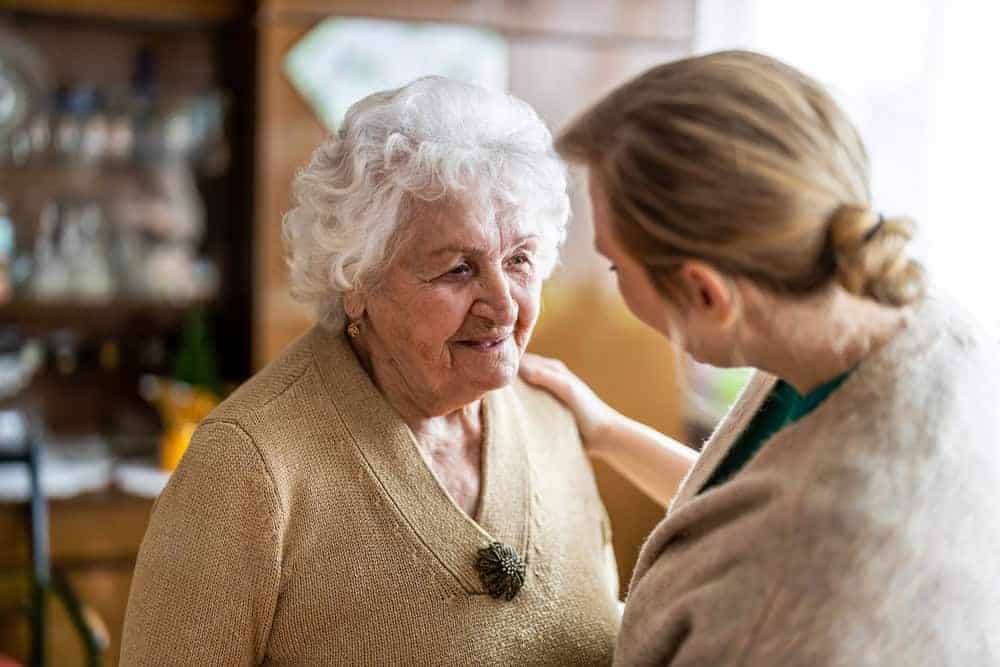
3. Consult with Healthcare Professionals
Speak with your loved one’s doctor, nurse, or social worker to get professional input. Healthcare providers can offer a clear assessment of your loved one’s condition and may recommend home health services as part of a comprehensive care plan.
4. Consider Starting with Temporary or Trial Care
If you’re not sure if a full-time home health aide is the right solution, you might want to try temporary or part-time care first. This allows your loved one to adjust to having help and allows you to evaluate how well the arrangement works.
Finding the Right Home Health Aide
Once you’ve determined that your loved one could benefit from a home health aide, the next step is to find the right person or home health provider to offer care.
Here are important steps to guide your search:
Consider Qualifications and Training
It’s essential to hire a home health aide with the proper qualifications and training. Some states require home health aides to complete formal certification programs, while others may only require on-the-job training.
Make sure that the aide meets your state’s requirements and has the experience necessary to provide the specific level of care your loved one needs. Ask about any additional training, such as CPR or specialized care for conditions like Alzheimer’s or Parkinson’s.
Assess Experience with Similar Needs
Find a home health aide who has experience caring for individuals with similar conditions or needs.
For example, if your loved one has mobility issues, cognitive impairments, or needs specific medical assistance, ensure the aide has successfully cared for patients in similar situations. Experienced aides will be better prepared to handle challenges and provide the care your loved one requires.
Review References and Agency Reputation
Whether you are hiring directly or through an agency, it’s crucial to check the aide’s references. When working with an agency, inquire about their vetting process, background checks, employee training, and testimonials.
If you’re hiring independently, request references from past employers or clients. You can also ask friends, family, or healthcare professionals for recommendations and read online reviews to get a sense of the aide’s reputation.
Evaluate Personality and Compatibility
The relationship between the home health aide and your loved one is critical for the best care. Beyond qualifications, it’s essential to find someone whose personality and communication style align with your loved one’s preferences.
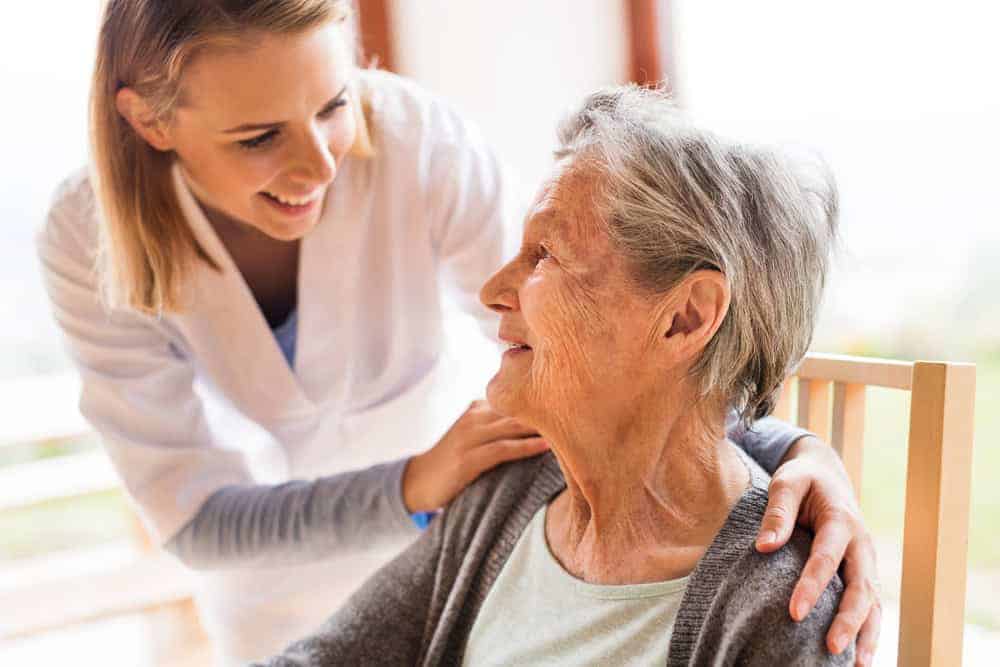
Arrange for a meet-and-greet before making a final decision to observe how well they interact. A good rapport can make all the difference in ensuring your loved one feels comfortable, safe, and supported.
Define the Scope of Care
Clarify the exact services your loved one needs before hiring a home health aide. Some aides provide medical assistance, such as wound care or medication management, while others focus on personal care, such as bathing, dressing, and mobility assistance.
For instance, at Amy’s Eden Senior Care, our aides provide exceptional non-medical services to help our clients lead a quality life.
Create a detailed list of responsibilities to ensure the aide you choose is well-equipped to provide the necessary care.
Understand Availability and Scheduling
When hiring a home health aide, ensure their availability matches your loved one’s needs. Determine whether they can provide full-time care, part-time care, or live-in assistance, depending on the level of support required.
It’s also important to ask how flexible they are with their schedule in case of emergencies or changes in care needs.
This is why we advise hiring from an agency so that in the event of unavoidable absence of the HHA, the agency can easily find a replacement.
Interview Multiple Candidates
It’s advisable to interview several candidates, or agencies to compare their qualifications, experience, and personalities. This helps ensure you make an informed decision about who is the best fit for your loved one’s care. During the interview, ask about
- Their approach to care
- How they handle challenging situations, and
- What they enjoy most about working with elderly clients.
This will help you assess their commitment and compassion for the role.
How To Pay For HHA Services
While the costs of HHA services vary depending on the level of care, geographic location, and whether the aide is hired privately or through an agency, there are several options available to help cover these expenses.
Below are some of the most common methods for paying for home health aide services:
1. Private Pay (Out-of-Pocket)
This is one of the most common ways to cover HHA expenses. Families pay directly for the services, and rates are usually determined by the number of hours or the type of care needed.
This option provides the most flexibility in choosing a caregiver and tailoring services to meet specific needs, but it can be costly over time. You and your loved one should assess your budget to determine if this option is sustainable in the long term.
2. Long-Term Care Insurance
Long-term care insurance is a type of insurance policy specifically designed to cover the costs associated with in-home care, nursing homes, and other long-term care services.
If your loved one has a long-term care insurance policy, it may cover a significant portion of home health aide services, especially if a physician has determined that home care is necessary.
Be sure to review the policy details carefully, as coverage amounts and eligibility requirements can vary.
3. Medicare
Medicare, the federal health insurance program primarily for people over the age of 65, can cover some home health aide services, but coverage is limited. Medicare only pays for home health aides if skilled nursing care or therapy is also needed, and the services must be provided through a Medicare-certified home health agency.
Additionally, the home health aide must be providing part-time or intermittent care, and the services must be deemed medically necessary by a doctor.
4. Medicaid
Medicaid is a joint federal and state program that provides health insurance to low-income individuals, including the elderly.
Medicaid offers more comprehensive coverage for home health aide services than Medicare, and eligibility requirements vary from state to state. Many states have Medicaid waiver programs that help pay for in-home care services, allowing elderly individuals to remain in their homes rather than entering a nursing facility.
If your loved one qualifies for Medicaid, it’s important to explore the home and community-based services (HCBS) programs available in your state.
5. Veterans Benefits
Veterans and their families may qualify for home health aide services through the Department of Veterans Affairs (VA).
The VA offers a variety of programs, including the Aid and Attendance benefit, which provides additional pension money to cover the costs of home health care for veterans who need assistance with daily living activities.
Veterans who are enrolled in the VA healthcare system may also be eligible for the Homemaker and Home Health Aide Care program, which provides in-home personal care services.
Takeaway
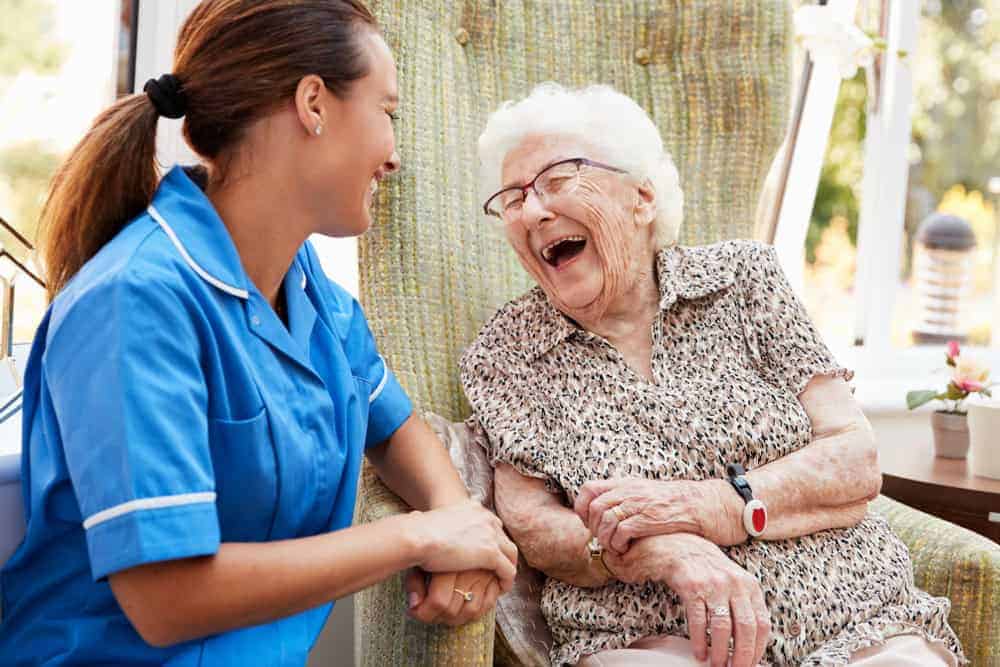
Home health aides can help your elderly loved one age at home, and retain their independence for as long as possible. HHAs provide both non-medical and basic medical care services. If your loved one is showing signs such as poor personal hygiene, forgetfulness, mobility challenges, or you’re getting overwhelmed with care, it may be time to hire an aide.
We recommend hiring through an agency like Amy’s Eden Senior Care, as the agency becomes responsible for vetting, training, and matching an agent to your loved one. In the event your home health aide is absent, a replacement can be sent easily.
At Amy’s Eden Senior Care, we offer non-medical HHA services which include personal care, dementia care, post-operative care, medication management, companion care, and more.
If you’re looking for the best-fit home health aide for your beloved senior, contact us today to learn more about our services, and we can help your loved one enjoy their twilight years in love and comfort.




